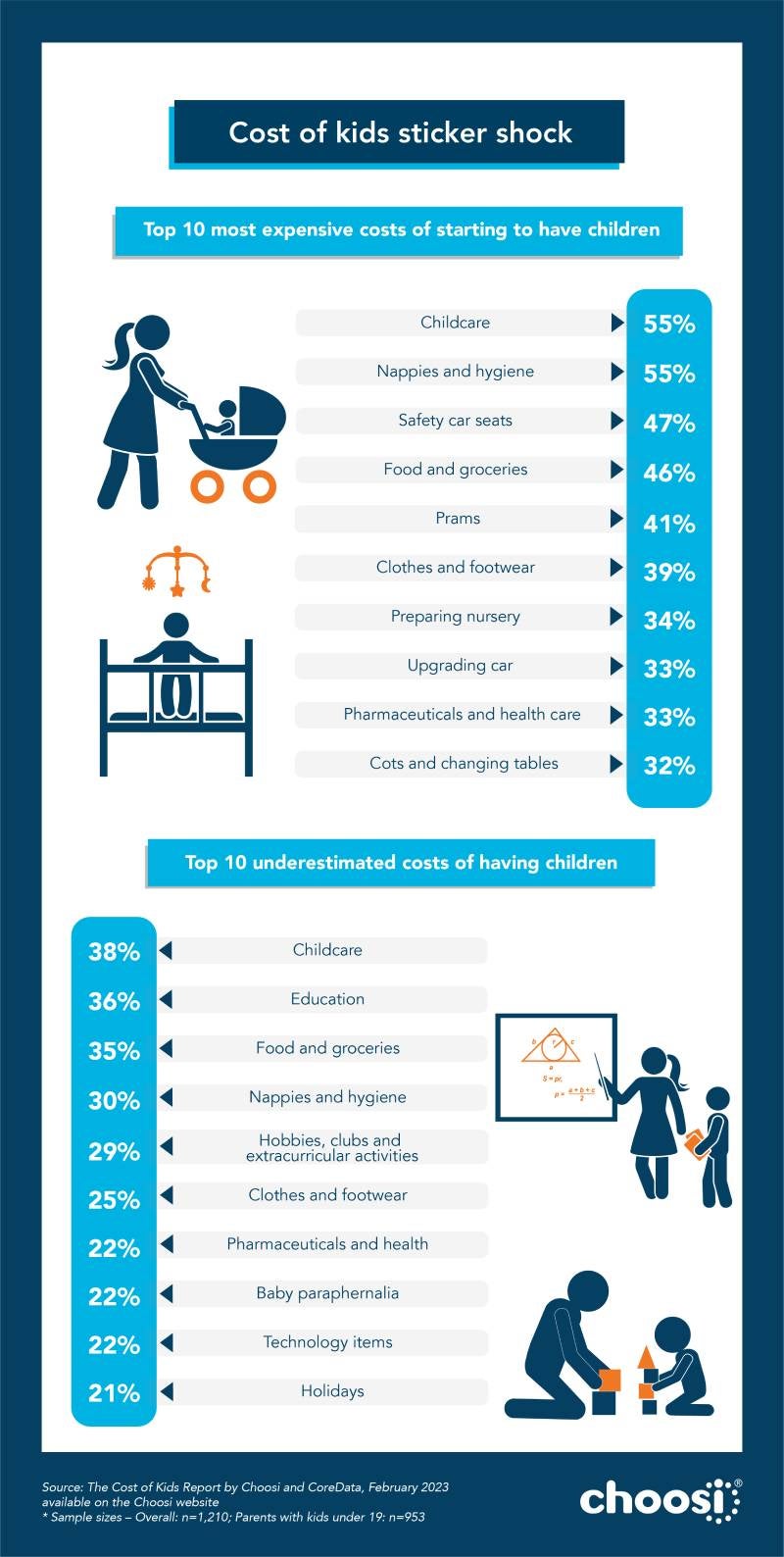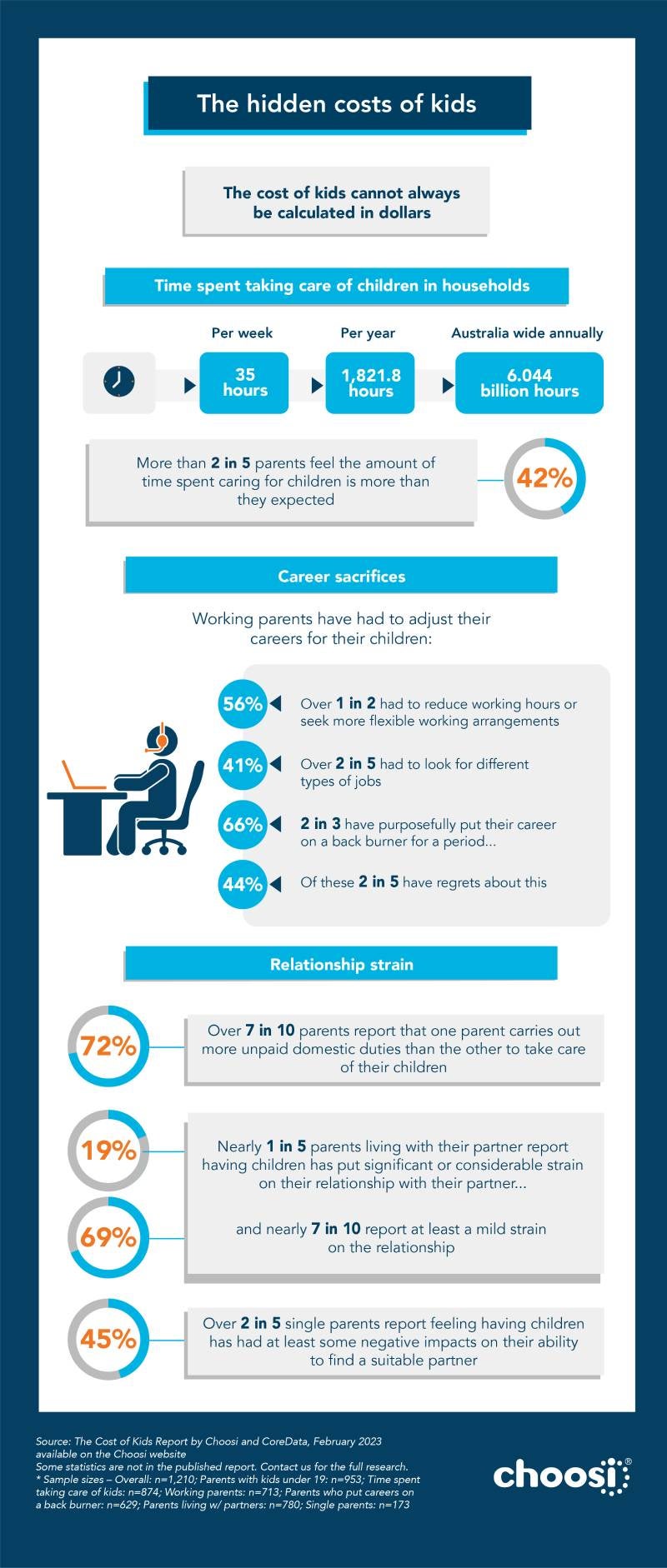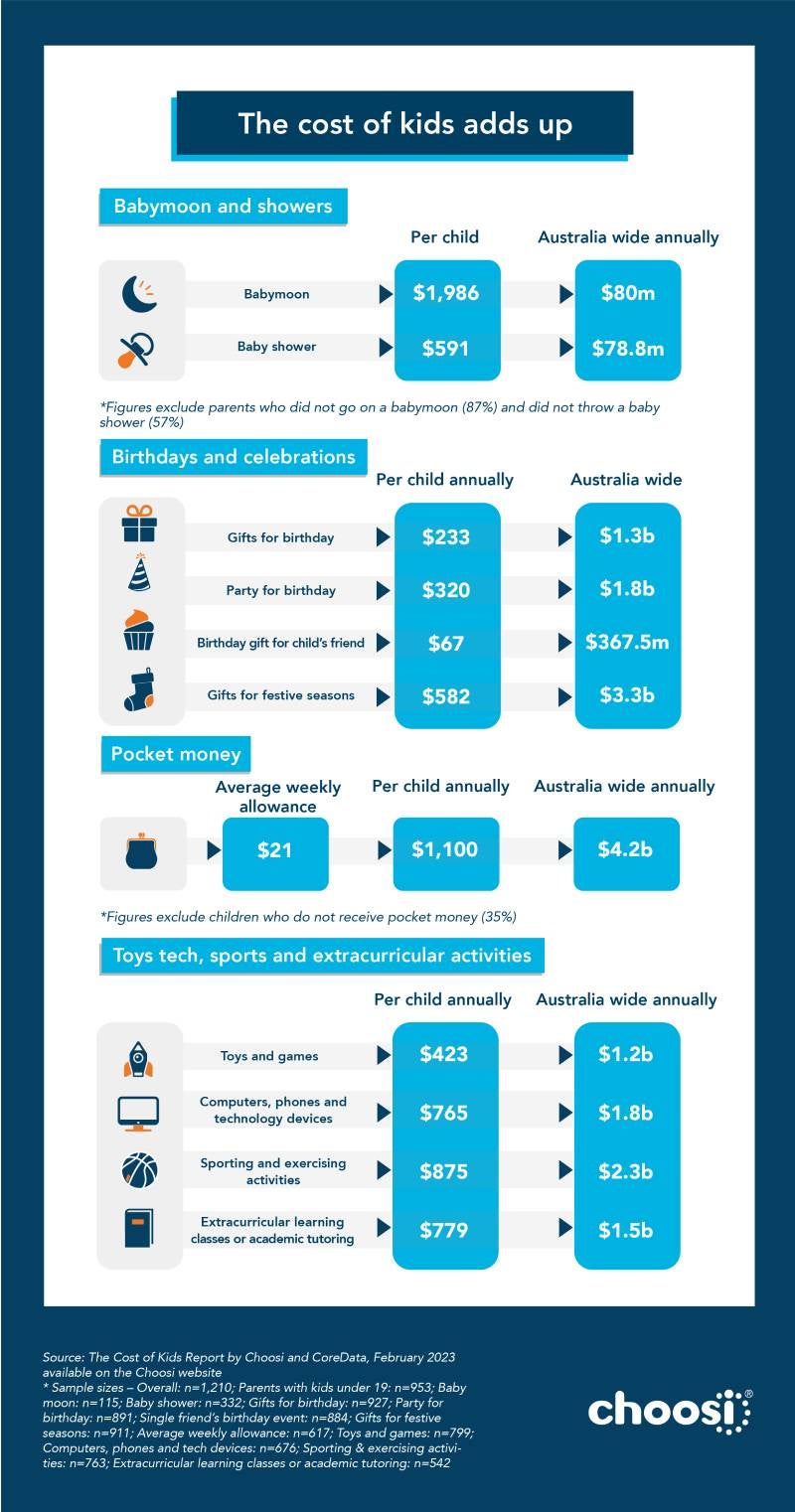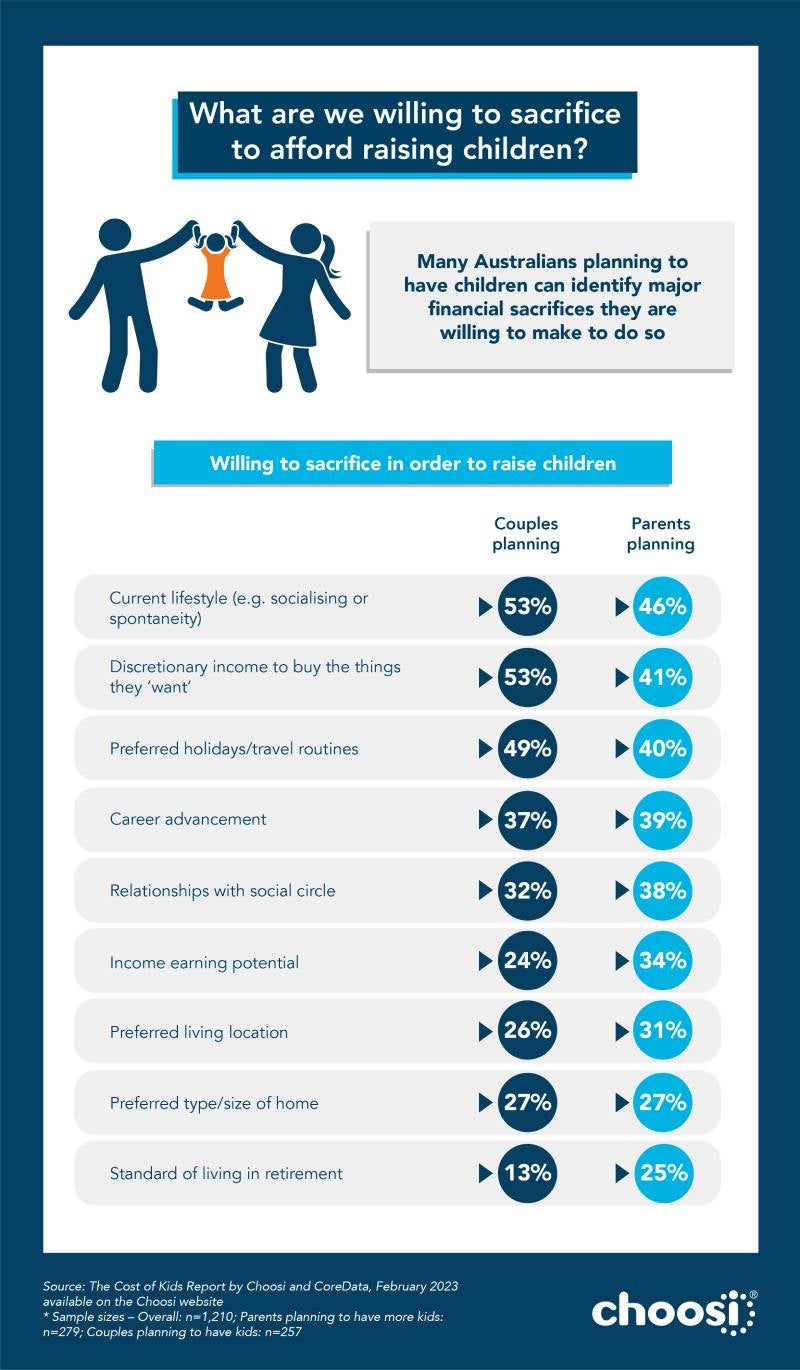The Choosi Cost of Kids Report 2023

Raising children can be one of the most rewarding jobs in the world, but it’s certainly not without its challenges. It can be such an exciting time when you decide to start a family, however, recently Aussie couples have been hit with a big surprise with the unexpected costs of raising a child as our Choosi Cost of Kids Report 2023 reveals.
More than half of parents (56%) have reported starting a family was more expensive than first expected, creating a divide between expected costs versus reality.
With the unforeseen costs of raising a child, do Aussies still have the same attitudes towards having children? Are they willing to sacrifice their current lifestyle, financial status or career to start a family, and have they financially prepared themselves for what’s to come?
The Choosi Cost of Kids Report 2023 forms part of the Choosi Research Series. In its latest instalment, this study explores the expected costs versus the real costs involved in raising children, and the general sentiment towards starting a family in Australia in 2023.
Baby talk is (not) cheap!
With local and global societal shifts such as the rising cost of living and economic market concerns, many couples (47%) feel that these changing circumstances in the last two years have impacted their decision around when to start having children – with some couples delaying having kids by up to two years (26%) or more (18%).
Having said that, more than half of parents (56%) feel that starting a family ended up being more expensive than they had expected (23% much more expensive). Childcare (38%), education (36%), and food and groceries (35%) emerged as the most underestimated costs by parents when starting a family.
The reported ideal age to start a family is 27 years old on average, with the average couple planning to have two children. However, a change of heart has erupted as most couples (84%) planning to start a family feel the cost has affected how many kids they are planning to have. Unsurprisingly, most parents (84%) who are likely to have more children feel the same.
When it comes to external financial help, many couples planning to start a family (63%) are expecting to get at least some financial support from their family. However, just over 2 in 5 parents (42%) claimed to receive financial support from their family when they started having children.

What's the hidden damage?
Beyond the inevitable costs of having a child, parents have also cited additional ‘hidden expenses’ that are costing them an arm and a leg.
The top unexpected costs when raising children for Aussie parents include kids growing out of clothes and footwear (34%), lost income and career momentum (29%), and lessons, tutoring, school trips and other extracurricular activities (27%). The research showed that parents also want to spoil their kids. This includes birthdays gifts $227; birthday parties $304; technology (games, computers, phones etc) $517; sport activities $697; and other extra curriculum classes or tutoring; $438, spent per year per child on average.

Babymoon plans still a go-ahead
Despite the surprise costs, many couples (34%) planning to have children still plan to indulge and go on a babymoon, expecting to spend an average of $3,701. When it comes to Aussie parents, just over 1 in 10 (13%) reported actually going on a babymoon, spending an average of $1,978.
On top of these costs, couples are still excited to throw a baby shower, with more than half (56%) planning to throw one when they have a child, with an expected average cost of $1,307.

Child travel discounts? Think again
As parents start planning travel and booking holidays, many young families have been left shocked by the cost of travelling with children. Parents estimated they spend $2,563 per year on holidays and travel with children. More than half (66%) feel they now pay more for each holiday with children, and just over a quarter (26%) were surprised by the increased cost. As a result, families have been rethinking travel destinations, length of stay and the type of holiday they take, and more than half (59%) have been missing their preferred holidays since having children.
However, quality family time is still the main priority for parents when on a family holiday (62%), and almost all (94%) families view holidays as an opportunity for children to experience the world.
Permanent Parental Leave
Between sleepless nights and ever-changing nappies, throwing work in the mix can make it even more challenging. In terms of careers for parents, many are still juggling with pausing their career to start or grow their families. It comes as no surprise that many parents feel having kids impacted their career priorities and commitments, with some having regrets. Some working parents (41%) have had to look for different types of jobs because of having children. The decision to deprioritise work is not an easy one, and some parents who did put their career on the back burner for children regret their decision (41%).
Many working parents (56%) have sought to reduce their working hours or seek flexible working arrangements because of having children, with majority of those (82%) who feel these decisions have negatively impacted their income. Flexible work hours and working from home seems to have worked for some parents, with almost half (46%) who have worked from home over the last two years. And many (68%) feel working from home and/or having flexi work arrangements has saved them money on after-school care related costs (29% considerable savings).

Realty bites
Finding a suitable rental property is hard enough as it is, and parents who do not own their home are really feeling the struggle when it comes to finding a suitable rental property with children (68%). Renting parents are also finding it more expensive than normal to rent when they have children (64%).
We all have a checklist of our desired property, and parents are finding that accommodating kids comes with special priorities and additional expenses. Features such as backyard space (66%), extra bedrooms (58%) and storage space (43%) are the top priorities for parents. And almost half (41%) want a larger property in general. Further, some current homeowning parents (35%) have also purchased a home in specific areas with some consideration to school zoning for their children.
Cost of Education
One of the biggest concerns for parents is the cost of education for their kids. Many parents have started saving early and making sacrifices to afford their school of preference. To prepare for the expenses, almost 2 in 5 (39%) said they started saving early, with almost half (44%) reporting that, in hindsight, they did not save enough. On average, parents estimate childcare and education is costing them $6,572 per year ($1,643 per quarter).
The often-heavy price tag that comes with private education has led to families (24%) changing their preference or decision to send child(ren) to private school at some stage due to affordability. Many parents who already have a child in private school (70%) are also feeling pressure to be able to continue affording private school with rising school fees and cost of living.
Kids vs. Relationships
But it’s not just expenses that having children affects, it’s also wellbeing. Many parents (69%) feel that having children has put a significant, or at least a mild strain on their relationship. Parents estimate they spend 34.4 hours per week on taking care of their children. The amount of time parents now spend caring for their kids is more than expected (42%), without receiving any help from family (29%).
But it’s not all bad news, most parents (73%) feel that having children has a positive impact on their own health and wellbeing, with just over 2 in 3 (67%) single parents feeling the same.
In addition, most couples (72%) planning to have children expect having children will have a positive impact on their relationship with their partner.
Of course, parents and planning couples want what’s best for their children, but it is not always what you expect when it comes to expected costs versus reality. Nevertheless, changing priorities and shifting perspectives can make anything possible when you put family first.
Some figures are not in the published report. Please contact us if you would like access to the full research.
16 Feb 2023